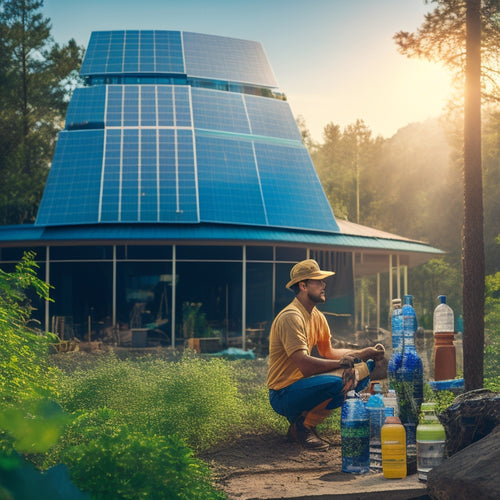
What Tax Credits Can Your Home Renovation Earn?
Share
You can claim significant tax credits for your home renovation, up to 26% of installation costs, by incorporating energy-efficient and renewable energy systems that meet specific federal and state standards. For instance, you're eligible for up to 10% tax credits for qualified energy-efficient improvements, and up to $50 for advanced main air circulating fans and $300 for qualified energy-efficient central air conditioners. Additionally, you can earn credits for solar panel installations, eco-friendly vehicle adoption, and more. To maximize your savings, it is crucial to research and understand the subtleties of these credits, so you can take advantage of the opportunities available to you next.
Key Takeaways
- Home renovations can earn up to 10% tax credit for qualified energy-efficient improvements, including windows, doors, and insulation.
- Solar panel installations qualify for a 26% tax credit, including labor and equipment costs, with no upper limit.
- Advanced main air circulating fans and energy-efficient central air conditioners are eligible for tax credits of up to $50 and $300, respectively.
- Tax credits for eco-friendly vehicle adoption and energy-efficient upgrades are also available, with varying limits and requirements.
- Accurate record-keeping of renovation expenses, including receipts and invoices, is essential to claim residential energy credits.
Federal Incentives for Green Homes
Since the Energy Policy Act of 2005, homeowners have been able to take advantage of federal incentives for making their homes more energy-efficient. You can claim a tax credit of up to 10% of the cost of qualified energy-efficient improvements, including sustainable materials like insulation, windows, and doors.
Additionally, you may be eligible for a credit of up to $50 for each advanced main air circulating fan, and $300 for a qualified energy-efficient central air conditioner. Home automation systems, such as smart thermostats, can also qualify for a credit.
Moreover, investing in electric vehicle charging infrastructure can also lead to significant savings through Federal and State Tax Incentives. These incentives can help offset the cost of making your home more sustainable and reducing your carbon footprint.
State and Local Tax Credits
While federal incentives provide a solid foundation for financing your green home improvements, you may be eligible for additional tax credits at the state and local level.
These local incentives can greatly reduce your tax liability, giving you more freedom to invest in your dream home. Be sure to investigate the following opportunities:
Some states offer tax deductions for energy-efficient upgrades, such as solar panels or insulation. Additionally, you may be able to take advantage of electric car grants and tax benefits, such as up to 75% funding for EV chargepoint installation, to further reduce your expenses.
Local governments may provide tax credits for specific green building practices, like rainwater harvesting or green roofing. Certain states have rebate programs for homeowners who install energy-efficient appliances or HVAC systems.
You may also be eligible for property tax exemptions or assessments for green home improvements. Remember to research the specific incentives available in your area, as they can vary widely.
Energy Star Certified Products
When renovating your home, you'll want to evaluate incorporating Energy Star certified products to maximize your tax credits. These products fall into specific categories, such as windows, doors, and roofing, which must meet rigorous energy efficiency standards.
By choosing certified products, you'll not only reduce your energy consumption but also benefit from a streamlined certification process that can help you claim your credits more easily.
In addition, it's crucial to investigate the federal tax credits available for eco-friendly vehicle adoption, which can additionally incentivize sustainable home renovations.
Moreover, understanding the credit eligibility rules can help you make informed decisions about your renovation project.
Eligible Product Categories
You can claim tax credits for home renovation by installing Energy Star certified products, which fall into several eligible product categories. These categories cover a range of home improvement and renovation projects, from windows and doors to roofing and insulation.
When considering energy-efficient upgrades, it's worth noting that Federal EV Tax Credits can also be applied to electric vehicles, further reducing costs for eco-friendly fleet shifts. Similarly, on-site clean energy generation through solar-powered charging infrastructure can decrease reliance on the electrical grid, lowering operating costs.
- Windows, doors, and skylights that meet Energy Star requirements
- Metal and asphalt roofing products with pigmented coatings or granules specifically designed to reduce heat gain
- Insulation materials, such as spray foam, fiberglass, and cellulose, that meet Energy Star standards
- Advanced main air circulating fans that use considerably less energy than standard models
Energy Efficiency Standards
Energy Star certification serves as a benchmark for energy efficiency, ensuring that products meet stringent standards set by the U.S. Environmental Protection Agency. When you're planning a home renovation, incorporating Energy Star certified products can help you save energy and reduce your environmental impact.
| Energy Efficiency Measures | Energy Star Certification Benefits |
|---|---|
| Home Insulation | Improves energy efficiency by up to 30% |
| Energy Audits | Identifies areas for improvement, reducing energy waste |
| Windows and Doors | Reduces heat transfer and energy loss |
| HVAC Systems | Optimizes heating and cooling performance |
Certification Process Benefits
Frequently, homeowners overlook the benefits of the Energy Star certification process, which can greatly impact the success of their home renovation project.
By obtaining Energy Star certification, you'll not only increase your home's energy efficiency but also gain access to beneficial advantages that can save you time and money. In addition, government incentives and grants, such as those for EV charging infrastructure, can also be utilized to support sustainable home renovations.
Moreover, these certifications can stimulate economic growth and job creation, much like the economic impact of EV fleet adoption.
Some key advantages of the certification process include:
- Increased property value through recognized energy efficiency
- Access to exclusive financing options and rebates
- Simplified renovation documentation, making it easier to claim tax credits
- Enhanced marketability of your home, appealing to environmentally conscious buyers
Solar Panel Installation Credits
You can claim a federal tax credit of up to 26% of the total cost of solar panel installation, including labor and equipment expenses, as part of the Solar Investment Tax Credit (ITC).
Additionally, you may be eligible for state rebate options, such as cash incentives or property tax exemptions, which vary by state and can further reduce your costs.
Federal Incentives Available
As part of the effort to reduce carbon footprint and promote sustainable living, the federal government offers attractive tax credits for homeowners who invest in solar panel installations.
You can claim a federal tax credit of up to 26% of the total cost of your solar panel installation. This credit can be claimed against your federal income tax liability, reducing the amount you owe.
Some key benefits of federal incentives for solar panel installations include:
- You can claim the credit for the tax year in which the installation is complete
- The credit can be carried over for up to five years if you don't owe enough taxes to claim the full credit
- You can finance your solar panel installation with home improvement loans and still claim the credit
- The credit is available for both primary and secondary residences
State Rebate Options
Beyond federal incentives, many states offer additional rebate options for homeowners investing in solar panel installations. You can benefit from state funding and local grants, which vary by location. Some states provide upfront rebates, while others offer tax credits or property tax exemptions.
| State | Rebate Amount | Eligibility |
|---|---|---|
| California | Up to $1,500 | Residential and commercial properties |
| New York | Up to $1,000 | Residential properties only |
| Massachusetts | Up to $2,000 | Residential and commercial properties |
| Florida | Up to $500 | Residential properties only |
Research your state's specific programs to maximize your savings. Don't miss out on these opportunities to reduce your solar panel installation costs.
Energy Efficiency Upgrade Incentives
Energy Efficiency Upgrade Incentives
You can claim tax credits for energy-efficient upgrades to your home. These upgrades not only reduce your energy consumption but also increase your home's value. To qualify, you'll need to conduct an energy audit to identify areas for improvement.
Based on the audit results, you can upgrade your home insulation, install energy-efficient windows, and improve your HVAC system.
Some energy-efficient upgrades that may qualify for tax credits include:
- Installing energy-efficient windows and doors
- Adding insulation to your attic, walls, or floors
- Upgrading to a high-efficiency furnace or boiler
- Sealing air leaks to prevent heat loss
Renewable Energy System Credits
You can tap into renewable energy sources to power your home and claim tax credits for the installation costs. By investing in solar panels, wind turbines, or geothermal heat pumps, you can reduce your reliance on fossil fuels and lower your energy bills. The federal government offers tax credits to encourage homeowners to adopt renewable energy systems.
| Renewable Energy System | Tax Credit Amount |
|---|---|
| Solar Energy Systems | 26% of total cost |
| Wind Turbines | 26% of total cost |
| Geothermal Heat Pumps | 26% of total cost |
| Fuel Cells | 26% of total cost |
| Small Wind Turbines | 26% of total cost |
These incentives can help offset the upfront costs of renewable energy systems, making it more affordable to achieve home efficiency improvements and enjoy the solar energy benefits.
Claiming Tax Credits for Renovations
As you investigate ways to tap into renewable energy sources, it's equally important to understand how to claim the tax credits that come with these eco-friendly upgrades.
To maximize your home improvement tax deductions, you'll need to keep accurate records of your renovation expenses.
Here are some essential steps to claim your tax credits:
- Keep receipts and invoices for all renovation-related expenses
- Document the installation and certification of renewable energy systems
- File Form 5695 with your tax return to claim residential energy credits
- Consult with a tax professional to verify you're taking advantage of all eligible credits
Frequently Asked Questions
Can I Claim Tax Credits for Renovations on a Rental Property?
You can claim tax deductions for renovations on a rental property, but you'll need to depreciate the expenses over time, rather than claiming them as credits, to minimize your taxable income and maximize your freedom.
How Long Do I Have to Keep Receipts for Tax Credit Claims?
You'll want to maintain careful receipt organization and tax documentation, keeping records for at least 3 years from the filing date, in case of an audit, to guarantee you can support your claims and enjoy the freedom from worry.
Are Energy-Efficient Appliances Eligible for Tax Credits?
You'll be pleased to know that, yes, energy-efficient appliances can qualify for tax credits, as they contribute to significant energy savings through appliance upgrades, which the government incentivizes to promote eco-friendly living and reduce your carbon footprint.
Can I Claim Tax Credits for DIY Home Renovations?
You can claim tax credits for DIY home renovations, but it's essential to understand Tax Credit Eligibility rules, ensuring your DIY Renovation Benefits qualify, and accurately documenting expenses to maximize your refund.
Do Tax Credits Expire if Not Claimed Within a Certain Timeframe?
You investigate the theory that tax credits expire if unclaimed within a certain timeframe, and indeed, they do; however, you can claim extensions, but it's essential to file on time to avoid missing out on eligible tax credit expiration deadlines.
Related Posts
-

What Tax Deductions Apply to Sustainable Building Materials?
You can claim various tax deductions for sustainable building materials, thanks to over 40 federal tax incentives sup...
-

What Do Power Strips Do for Standby Energy?
You're likely aware that your devices, such as TVs and computers, continue to draw power even when turned off, a phen...
-

3 Earth-Loving Furniture Tips for Energy-Smart Homes
When furnishing your energy-smart home, you have the power to reduce your carbon footprint greatly by making consciou...


